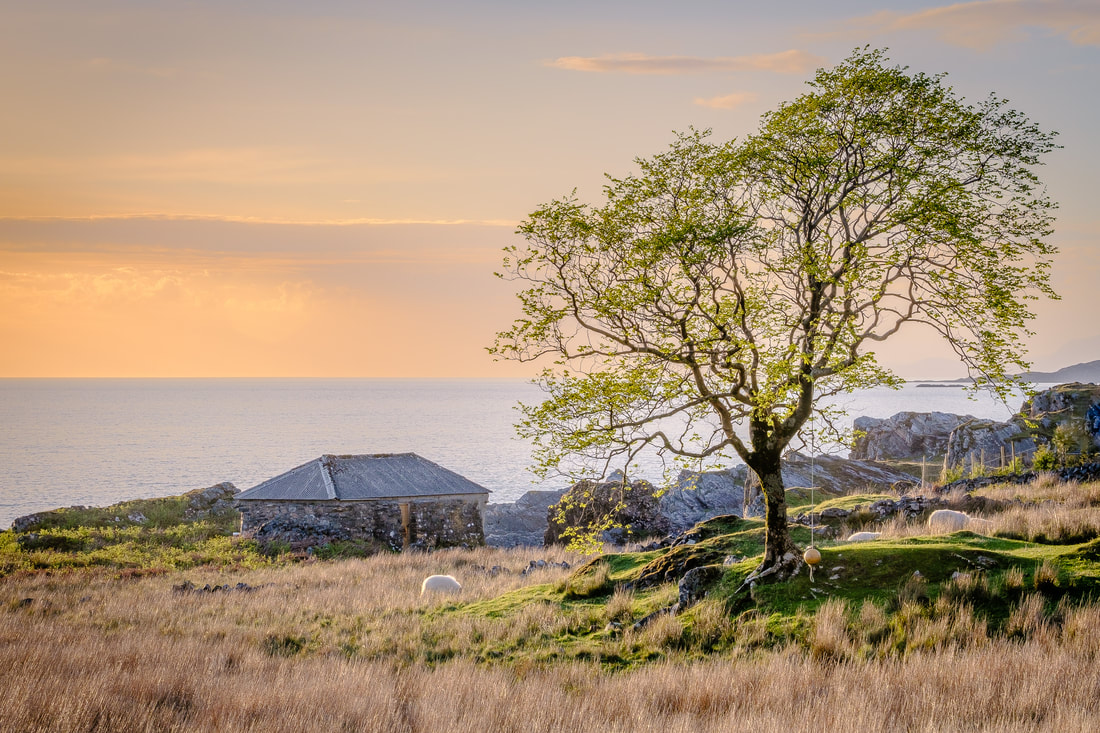|
As I write this, we are about halfway through meteorological Spring and the recent cold and wet weather seems to have delayed the awakening of the landscape from its winter slumber. The dawn chorus has not yet filled the early morning air with birdsong and the spring flowers are only just beginning to cover the ground with the usual multitude of bright colours. However, as April turns into May, I’m hopeful that I’ll soon hear my first cuckoo, whose distinctive call well and truly heralds the arrival of spring, just as it did when I was out at Smirisary on a beautiful mid-spring evening and captured the image below. In my mind, the cuckoo is one of the most iconic migratory birds to visit us each year. Its distinctive "cuck-oo" or "coo-coo" call resonates through misty mornings and still evenings, carrying promises of warmer days and the vibrant rebirth of flora and fauna. In addition to this, the bird itself is intertwined with various superstitions and legends.
One prevalent belief is that the timing of the cuckoo's arrival can predict the weather for the upcoming season. If the cuckoo is heard early in the spring, it was said to foretell a warm and prosperous summer ahead. Conversely, a late arrival was thought to signal a cold and harsh season, causing anxiety among farmers and villagers who relied on favourable weather for their livelihoods. The cuckoo's association with prophecy extends beyond meteorological predictions and into matters of love and luck. In some Scottish communities, it was believed that hearing the first call of the cuckoo could bring fortune to couples seeking to conceive a child. Newlyweds would eagerly await the arrival of the cuckoo, hoping that its call would bless their union with fertility and abundance. However, not all superstitions surrounding the cuckoo were benign. In certain folklore traditions, the cuckoo was viewed with suspicion and even fear, often being portrayed as a symbol of deceit and trickery. One particularly ominous belief is the notion of the "cuckoo's curse," which suggests that hearing the bird's call on certain days, especially Sundays or while in bed, could bring misfortune or even death to the listener or their family. The mysterious nature of the cuckoo is further accentuated by its peculiar habits, including its brood parasitism behaviour. Unlike most birds, which build nests and care for their young, the cuckoo lays its eggs in the nests of other bird species, relying on them to raise its offspring. This behaviour has led to the cuckoo being associated with themes of deception and betrayal in folklore, because it exploits the labour and resources of unwitting foster parents. Beyond its cultural significance, the cuckoo's presence also serves as a barometer of ecological health, reflecting the condition of its breeding habitat and the availability of its preferred food sources. Concerns about habitat loss, climate change, and the decline of insect populations have led to conservation efforts aimed at preserving and restoring the cuckoo's habitat. They include protecting vital breeding grounds, restoring degraded ecosystems, and raising awareness about the importance of migratory birds. Despite these efforts, the cuckoo faces an uncertain future in Scotland. Like many migratory birds, it must navigate a perilous journey here which is fraught with challenges, while avoiding predation and dealing with climate-induced disruptions in food availability. In addition, its dependence on other species, such as the reed warbler and meadow pipit, for egg incubation and chick rearing further complicates its conservation. Yet, amidst these challenges, there is cause for hope. The resilience of the cuckoo, coupled with the dedication of conservationists and the support of local communities, offers a glimmer of optimism for its continued survival. By fostering greater awareness, understanding, and appreciation for this charismatic bird the conservationists hope that they can ensure that future generations will be able to delight in the timeless spectacle of the cuckoo's arrival in a Scottish spring. I, for one, hope that they succeed.
8 Comments
Mr. M D Pittock
21/4/2024 19:52:19
Thanks for good script on the arrival of the cookoo for me a good sign of spring though sadly not so many stop but to hear them and sometimes lucky to see one special thanks for information of old tales
Reply
Amanda Prescott
22/4/2024 07:53:09
Great, interesting read. Love hearing my first cuckoo and it’s often during our travels in Scotland in May.
Reply
Jacqueline Love
23/4/2024 12:44:38
This is really interesting. I had no idea that cuckoos were so interesting, or that they were attributed to so many superstitions. I'll need to look up my bird book and check them out. Let's hope that the lateness of hearing the call does not bring on the cold and wet weather. All animals are clever but the chicks being nurtured and fed by the other birds is just amazing. Firstly that the other species, obviously does it willingly and the fledglings will repeat the same process when it's their turn to mate.
Reply
Jacqueline Love
23/4/2024 13:32:19
This is really interesting. I'll be looking up my bird book to learn more about cuckoos. What I find really peculiar, is, the egg laying and nurturing process. Mostly that, although the chicks are being fed by another species, who will also have their own chicks, the fledgeling cuckoos, will repeat the same process with their own eggs. All animals are extremely clever in their own ways.
Reply
Your comment will be posted after it is approved.
Leave a Reply. |
AuthorHi, Archives
July 2024
Categories
All
|
Steven Marshall Photography, Rockpool House, Resipole, Strontian, Acharacle, PH36 4HX
Telephone: 01967 431 335 | Mobile: 07585 910 058 | Email: [email protected]
Telephone: 01967 431 335 | Mobile: 07585 910 058 | Email: [email protected]
All Images & Text Copyright © 2024 - Steven Marshall - All Rights Reserved


